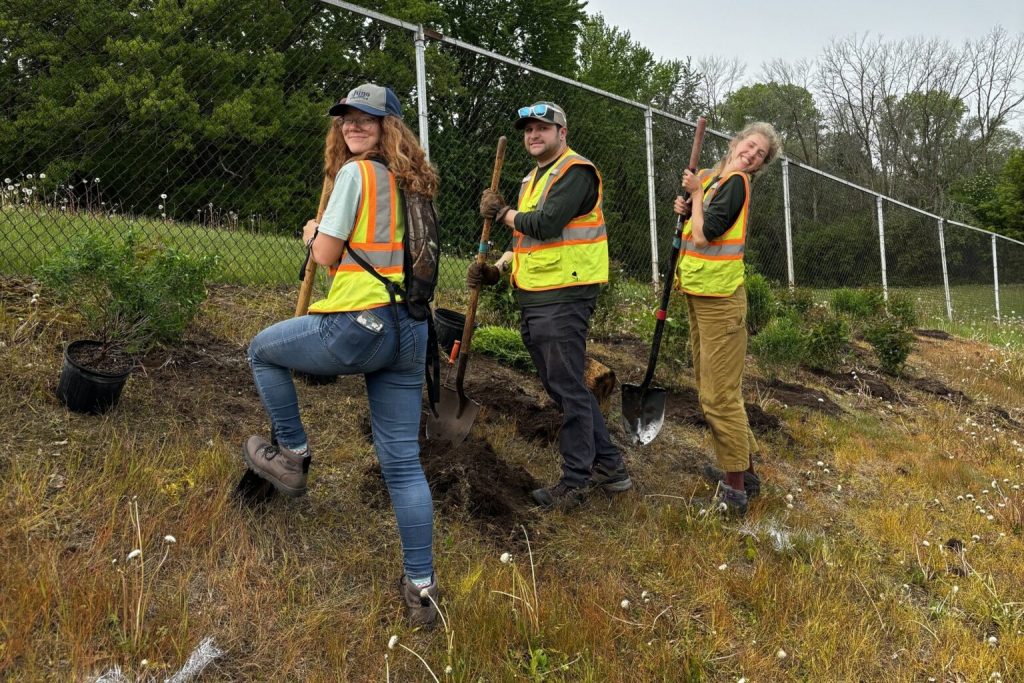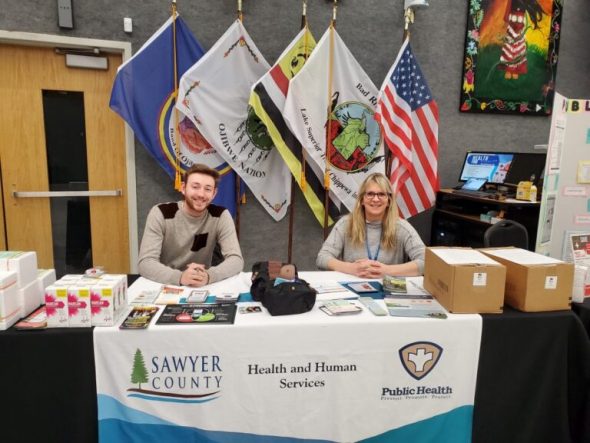Court Hands a Lifeline to Americorps But Its Future Uncertain
Wisconsin has 25 AmeriCorps programs. 'Things are just very confusing.'

Green Bay Conservation Corps workers, from left, Emily Swagel, Zak King and Cailie Kafura, plant native shrubs in Fireman’s Park. The work is part of installing a pollinator corridor and a larger land restoration project across Green Bay. (Photo courtesy of Green Bay Conservation Corps)
Jake White says he was lucky.
A University of Wisconsin-Madison graduate with a global health major, White was in his second year of an AmeriCorps placement in the Sawyer County Public Health Department, where he helped out with department reports and outreach to the community. Then AmeriCorps pulled the plug at the end of April — cancelling its grants to agencies all across the country.

Jake White, on the left, and public health nurse Mary Slisz-Chucka represented Sawyer County Public Health at a community health fair on the campus of Lac Courte Oreilles Ojibwe University in March. (Photo courtesy of Jake White)
White was in the middle of working with a team assigned to produce a community health assessment for the county when he got the news. Sawyer County kept him on so he could stick with the project, converting his position to a limited-term employee (LTE) through the end of June, when White starts medical school in Wausau.
The reprieve also gave him a chance to hand over a second project, on substance abuse prevention, to another community member, White said. The future of that work was one of his biggest worries about AmeriCorps’ sudden shutdown.
His AmeriCorps experience at the county “really gave me the foundation for the skills and knowledge I will carry into my role as a physician,” White told the Wisconsin Examiner.
The aftermath of the AmeriCorps shutdown didn’t go as smoothly for Maxwell Robin. He was placed with the St. Vincent DePaul charitable pharmacy in Madison.
“I did whatever needed to be done,” Robin said — working on computer projects at the pharmacy, filling prescriptions, serving as an interpreter for Spanish-speaking patients.
When the AmeriCorps cancellation notice arrived, the projects he was working on “got thrown into chaos,” Robin said a week after the notification.
Now a federal judge has ordered AmeriCorps to restore its grants and reinstate its volunteers. But all of that remains up in the air.
“Things are just very confusing now,” Robin said Friday.
Despite that, Robin has been able to move on. He is waiting to hear back from several job applications.
“We were able to take people who, for whatever reason, had been kicked to the side,” Robin said.
The federal judge’s order, issued Thursday, includes an injunction ordering the federal government to reverse the cancellation of AmeriCorps grants and projects across the country and to restore those programs, funding and personnel.
But program administrators still don’t know for sure what will happen and when.
“We are still waiting for official notification from AmeriCorps,” said Jeanne Duffy, the executive director of Serve Wisconsin, in an email message Friday.
Serve Wisconsin, based in the Wisconsin Department of Administration, is the state administrator for AmeriCorps.
Wisconsin has 25 AmeriCorps programs operating in more than 300 locations across the state — volunteers who are paid a stipend and who work in health care, help with environmental projects, assist in school classrooms and carry out other projects.
When the Trump administration canceled AmeriCorps grants April 25, the action caught participants in the program as well as officials responsible for coordinating its work by surprise.
Thursday’s order, by U.S. District Judge Deborah L. Boardman in Maryland, found that the Corporation for National Community Service, the agency that operates AmeriCorps, and its administration “likely violated the Administrative Procedure Act by failing to engage in notice-and-comment rulemaking before making significant changes to service delivery, that the plaintiffs will be irreparably harmed if this injunction does not issue, and that the balance of the equities and the public interest favor an injunction.”
The cancellation affected programs all over Wisconsin that have worked with AmeriCorps, some of them for years, and the volunteers who have flocked to AmeriCorps looking for experience through community service work.
“It’s a tragedy,” said state Rep. Supreme Moore Omokunde (D-Milwaukee), who spent two years as an AmeriCorps participant 15 years ago. “AmeriCorps is about volunteerism. We have limited resources and we have this unlimited need.”
In Green Bay, AmeriCorps helped staff the Green Bay Conservation Corps. Founded in 2022, the Conservation Corps has fielded teams of AmeriCorps members each year on projects that have included establishing a pollinator corridor through the city, removing invasive plants, maintaining walking trails and restoring area streams.
“Altogether we’ve seen over 70 AmeriCorps members come through our doors,” said Maria Otto, the Green Bay Conservation Corps coordinator. “They’re the ones getting the work done.”
The Green Bay city council passed a measure covering the rest of the 2025 service year from city funds.
“After two weeks of uncertainty, our entire crew was able to work for the Conservation Corps again” thanks to the funds, said Cailie Kafura, one of the AmeriCorps volunteers. The money will allow the program’s work to keep going through August.
Lynn Walter operates a nonprofit, New Leaf Foods, that promotes access to healthy food and education in the greater Green Bay area. Founded 15 years ago, New Leaf began working with AmeriCorps five years ago through a partnership with Marshfield Clinic. The clinic deploys AmeriCorps participants on health-related projects around the state.
Walter said Friday after the cancellation she was able to retain one of her three AmeriCorps participants this year on a contract basis. A second AmeriCorps member chose to stay on as a volunteer to complete a project she had been working on, while the third needed more paid hours and went to another job.
Even with the court ruling, Walter said, she’s been told that what happens next remains uncertain. And she fears there’s been longer-term damage regardless of what happens in the court case.
“Even if the program starts up again, there won’t be the momentum that there has been in the past,” Walter said. She expects prospective participants to be wary of signing up in the future: “What would you tell a young person?”
In his early 30s, Omokunde joined Public Allies, a leadership development nonprofit, in 2010 and 2011 as an AmeriCorps participant. He called the experience “a tipping point” for him personally and professionally.
“One of the core values is collaboration,” Omokunde said. “It taught me that collaboration is one of the most difficult things to do — but it’s one of the most necessary things to do.”
Omokunde is blunt in his assessment of why AmeriCorps was targeted in President Donald Trump’s second term.
“I think it follows a long tradition of people not valuing the work that is done in certain communities,” Omokunde said. “Donald Trump is a bully. He doesn’t want anything in opposition to him and his agenda.”
Omokunde ticked off a list of colleagues in politics who came up through AmeriCorps and Public Allies: State Rep. Darrin Madison (D-Milwaukee), Milwaukee County Executive David Crowley, former state Rep. David Bowen, and the late Milwaukee alder Jonathan Brostoff, also a former Assembly member.
“When he sees this cadre of individuals who are rooted in community and learning about asset-based community development, diversity and being committed to anti-oppression as well, people who represent all people, he doesn’t want that kind of opposition,” Omokunde said. “He just wants people to go along and do his bidding.”
If you think stories like this are important, become a member of Urban Milwaukee and help support real, independent journalism. Plus you get some cool added benefits.
Political Contributions Tracker
Displaying political contributions between people mentioned in this story. Learn more.
- December 17, 2015 - David Crowley received $100 from David Bowen





















